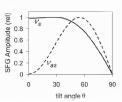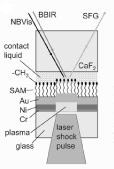Ultrafast ~1 GPa shock compression of self-assembled all-trans hydrocarbon monolayers (SAMs) with an even number (18) or an odd number (15) of carbon atoms was studied with vibrational sum-frequency generation spectroscopy (SFG). Both SAMs are in the long-chain limit, generally taken to be ≥ 14 carbon atoms, so the significant difference is the odd-even zigzag alternation of bond angles. By modeling the shock loading process with simulations, we find the molecular basis for elastic behavior in the 15-carbon SAMs is terminal methyl and all-chain tilting and for viscoelastic behavior in the 18- carbon SAMs it is trans-to-gauche isomerization.


To download a reprint of this paper [Patterson, J.E. et al., Phys. Rev. Lett., 94, 015501 (2005)], follow this link

